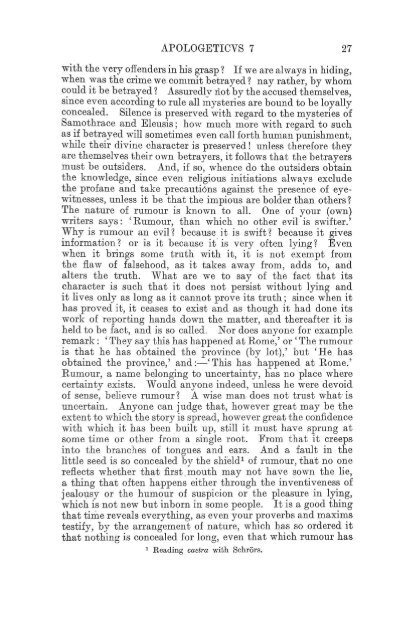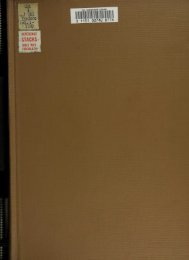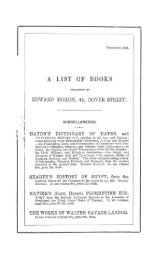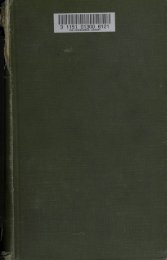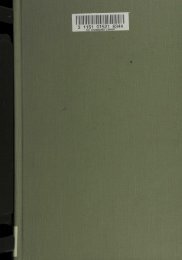- Page 2: Tfhio LIBRARY OF THE JOHNS HOPKINS
- Page 6 and 7: CAMBRIDGE UNIVERSITY PRESS C. F. CL
- Page 8 and 9: -"7 - ,,,\j-\ I ^- ^^rhff^/ 0^ •
- Page 10 and 11: VI PEEFACE in, and to cut out refer
- Page 12 and 13: ADDENDA BT CORRIGENDA page 13, line
- Page 14 and 15: X INTRODUCTION G. R. Hauschild, Die
- Page 16 and 17: xii INTRODUCTION P. Hen en. Index v
- Page 18 and 19: xav INTRODUCTION listen to guesses
- Page 20 and 21: XVI INTRODUCTION gists than Le Nour
- Page 22 and 23: xvm INTRODUCTION Of the adaptations
- Page 24 and 25: XX INTRODUCTION rather than a liter
- Page 26 and 27: TERTVLLIANI APOLOGETICVS 1. Si non
- Page 28 and 29: 4 TERTVLLIANI odii iustitia defendi
- Page 30 and 31: 6 TERTVLLIANI uel fato uel astris i
- Page 32 and 33: 8 TERTVLLIANI quibusdam Christianis
- Page 34 and 35: 10 TERTVLLIANI utique negemus et sc
- Page 36 and 37: 12 TERTVLLIANI esse quam per uim ne
- Page 38 and 39: 14 TERTVLLIANI quam lasciua, quam f
- Page 40 and 41: 16 TERTVLLIANI nee tantum refutabo
- Page 42 and 43: 18 TERTVLLIANI erant, consensu tame
- Page 44 and 45: 20 TERTVLLIANI Caesariano gladio fe
- Page 46 and 47: 22 TERTVLLIANI senatu submouebant,
- Page 48 and 49: 24 TERTVLLIANI proauis renuntiastis
- Page 52 and 53: 28 TERTVLLIANI distulit. Merito igi
- Page 54 and 55: 30 TERTVLLIANI candelabra et lucern
- Page 56 and 57: 32 TERTVLLIANI conuertar ad populum
- Page 58 and 59: 34 TERTVLLIANI uester Christianis,-
- Page 60 and 61: 36 TERTVLLIANI pueri. Haec in nobis
- Page 62 and 63: 38 TERTVLLIANI Graecus aut Thallus
- Page 64 and 65: 40 TERTVLLIANI quidem si ipsi se fa
- Page 66 and 67: 42 TERTVLLIANI indigne nee prodige
- Page 68 and 69: 44 TERTVLLIANI instrumentorumque co
- Page 70 and 71: 46 TERTVLLIANI non colitis, offendi
- Page 72 and 73: 48 TERTVLLIANI facitis, licet non n
- Page 74 and 75: 50 TERTVLLIANI deos destruebat. Pla
- Page 76 and 77: 52 TERTVLLIANI ludicra ista sint. C
- Page 78 and 79: 54 TERTVLLIANI negabitis et iumenta
- Page 80 and 81: 56 TERTVLLIANI serpentes, et planta
- Page 82 and 83: 58 TERTVLLIANI 18. Sed quo plenius
- Page 84 and 85: 60 TERTVLLIANI phus, prouidentiae u
- Page 86 and 87: .62 TERTVLLIANI necesse est. Inde q
- Page 88 and 89: 64 TERTVLLIANI antecedit, possem et
- Page 90 and 91: 66 TERTVLLIANI quod et monstris et
- Page 92 and 93: 68 TERTVLLIANI extorres uagantur pe
- Page 94 and 95: 70 TERTVLLIANI ita et quod de deo p
- Page 96 and 97: 72 TERTVLLIANI Pentio Pilato, Syria
- Page 98 and 99: 74 TERTVLLIANI sanguinem Christianu
- Page 100 and 101:
76 TERTVLLIANI execramenti uoce pro
- Page 102 and 103:
78 TERTVLLIANI Ceterum testudinem d
- Page 104 and 105:
80 TERTVLLIANI uerba; iam hinc demo
- Page 106 and 107:
82 TERTVLLIANI eisdem dels uestris
- Page 108 and 109:
84 TERTVLLIANI Nollent itaque uos t
- Page 110 and 111:
86 TERTVLLIANI auibus et bestiis co
- Page 112 and 113:
88 TERTVLLIANI apud Sirmium reipubl
- Page 114 and 115:
90 TERTVLLIANI certantia ad caelum,
- Page 116 and 117:
92 TERTVLLIANI religiones regna pra
- Page 118 and 119:
94 TERTVLLIANI 28. Quoniam autem fa
- Page 120 and 121:
96 TERTVLLIANI toris, quia illos no
- Page 122 and 123:
98 TERTVLLIANI conscientiam spurcam
- Page 124 and 125:
100 TERTVLLIANI Ceterum daemonas, i
- Page 126 and 127:
102 TERTVLLIANI turpissima sed et p
- Page 128 and 129:
104 TERTVLLIANI Quirites, ipsam uer
- Page 130 and 131:
106 TERTVLLIANI scrutari super Caes
- Page 132 and 133:
108 TERTVLLIANI de tam animatis ad
- Page 134 and 135:
110 TERTVLLIANI necessarium hostes
- Page 136 and 137:
112 TERTVLLIANI erigiraus, fiduciam
- Page 138 and 139:
114 TERTVLLIANI usurpant, sed et su
- Page 140 and 141:
116 TERTVLLIANI sed ad eandem curam
- Page 142 and 143:
118 TERTVLLIANI illic arborum. poma
- Page 144 and 145:
120 TERTVLLIANI dimus, deum tangimu
- Page 146 and 147:
122 TERTVLLIANI gymnosophistae sumu
- Page 148 and 149:
124 TERTVLLIANI uestrarum professio
- Page 150 and 151:
126 TERTVLLIANI disciplinae ad inno
- Page 152 and 153:
128 TERTVLLIANI innocentiam, iustit
- Page 154 and 155:
130 TERTVLLIANI Sexum nee femineum
- Page 156 and 157:
132 TERTVLLIANI proficit antiquitas
- Page 158 and 159:
134 TERTVLLIANI terunt. Ex horum se
- Page 160 and 161:
136 , TERTVLLIANI muliere, et in ea
- Page 162 and 163:
138 TERTVLLIANI et tunc require qua
- Page 164 and 165:
140 TERTVLLIANI in immensam aeterni
- Page 166 and 167:
142 TERTVLLIANI uestrum, quibus fau
- Page 168 and 169:
144 TERTVLLIANI et in captiuitate u
- Page 170 and 171:
146 TERTVLLIANI tiam doloris et mor
- Page 172 and 173:
In the following places Prof. Mayor
- Page 174 and 175:
ABBREVIATIONS^ The following are th
- Page 176 and 177:
152 TERTVLLIANI [p. 21. 18— Chr(^
- Page 178 and 179:
154 TERTVLLIANI [p. 6 1. 1— p. 6
- Page 180 and 181:
156 TERTVLLIANI [p. 6 I. 21— quem
- Page 182 and 183:
158 TERTVLLIANI [p. 81. 9-^ procons
- Page 184 and 185:
160 TERTVLLIANI [p. 10 1. 8— p7^p
- Page 186 and 187:
162 TERTVLLIANI [p. 12.1. 7— p, 1
- Page 188 and 189:
164 TERTVLLIANI [p. 14 1. 3— c, 5
- Page 190 and 191:
166 TERTVLLIANI [p.. 14 1. 13^ the
- Page 192 and 193:
168 TERTVLLIANI [p. 16.1. 13— rat
- Page 194 and 195:
170 TERTVLLIANI [p. 161. 32r- iuris
- Page 196 and 197:
172 TERTVLLIANI [p. 181. 23— deus
- Page 198 and 199:
174 TERTVLLIANI [p. 18 1, 26— ver
- Page 200 and 201:
176 TERTVLLIANI [p. 20 1, 3— DE C
- Page 202 and 203:
178 TERTVLLIANI [p. 20 1. Il ls a
- Page 204 and 205:
180 TERTVLLIANI [p. 20 1. 20— foo
- Page 206 and 207:
182 TERTVLLIANI [p. 22 1. 6— in J
- Page 208 and 209:
184 TERTVLLIANI [p. 22 I. 26— auc
- Page 210 and 211:
186 TERTVLLIANI [p. 24 1. 13— Hie
- Page 212 and 213:
188 TERTVLLIANI [p. 24 1. 19— Dir
- Page 214 and 215:
190 TERTVLLIANI [p. 241. 27— acce
- Page 216 and 217:
192 TERTVLLIANI [p, 26 1. 27— p.
- Page 218 and 219:
194 TERTVLLIANI [p. 28 1. 10— sol
- Page 220 and 221:
196 TERTVLLIANI [p. 30.1. 14— .SA
- Page 222 and 223:
198 TERTVLLIANI [p. 30 1. 23— fil
- Page 224 and 225:
200 TERTVLLIANI [p. 30 1. 28— Sat
- Page 226 and 227:
202 TERTVLLIANI [p. 32 1. 11— p.
- Page 228 and 229:
204 • TERTVLLIANI [p. 32 1. 22^ e
- Page 230 and 231:
206 TERTVLLIANI [p. 34 1. 15— atr
- Page 232 and 233:
208 TERTVLLIANI [p. 341. 21— et q
- Page 234 and 235:
210 TERTVLLIANI [p, 34 L 32— 33 (
- Page 236 and 237:
212 TERTVLLIANI [p. 36 1. 9— tati
- Page 238 and 239:
214 TERTVLLIANI 10 [p. 36 1. 26—
- Page 240 and 241:
216 TERTVLLIANI [p. 38 1. 9— illo
- Page 242 and 243:
218 TERTVLLIANI [p. 38 1. 30— p,
- Page 244 and 245:
220 TERTVLLIANI [p. 401. 29— p, 4
- Page 246 and 247:
222 TERTVLLIANI [p, 42 1. 20— qua
- Page 248 and 249:
224- TERTVLLIANI [p. 42 1. 34— Co
- Page 250 and 251:
226 TERTVLLIANI [p, 44 1, 12— fj
- Page 252 and 253:
228 TERTVLLIANI [p. 44 1, 21— p,
- Page 254 and 255:
230 TERTVLLIANI [p, 441, 33— p,.
- Page 256 and 257:
232 TERTVLLIANI [p. 461. 12— rege
- Page 258 and 259:
234 TERTVLLIANI [p, 46 1. 30— pro
- Page 260 and 261:
236 TERTVLLIANI [p. 48 1. 10— fee
- Page 262 and 263:
2.38 TERTVLLIANI [p. 48 1, 18— Sa
- Page 264 and 265:
240 TERTVLLIANI [p, 48 1, 27— que
- Page 266 and 267:
242 TERTVLLIANI [p. 50 I, 3— Dei
- Page 268 and 269:
244 TERTVLLIANI [p. 50 1. 11— Mit
- Page 270 and 271:
246 TERTVLLIANI [P- 50 1. 20— ,.
- Page 272 and 273:
248 TERTVLLIANI [p. 52 1. 1— p. 5
- Page 274 and 275:
250 TERTVLLIANI [p, 52 1. 14— dBv
- Page 276 and 277:
252 TERTVLLIANI [p. 54 1. 4— et u
- Page 278 and 279:
254 TERTVLLIANI [p, 54 1. 14— Mar
- Page 280 and 281:
256 TERTVLLIANI [p. 54 1. 22— Bin
- Page 282 and 283:
258 TERTVLLIANI [p, 541. 28— Chri
- Page 284 and 285:
260 TERTVLLIANI [p. 56 1. 5— I. 5
- Page 286 and 287:
262 TERTVLLIANI [p. 56 1. 22— dom
- Page 288 and 289:
264 TERTVLLIANI [p, 581, 1— CAP,
- Page 290 and 291:
266 TERTVLLIANI [p. 58 1. 19— Mar
- Page 292 and 293:
268 TERTVLLIANI [p. 58 1. 33— nac
- Page 294 and 295:
270 TERTVLLIANI [p. 601. 8— circu
- Page 296 and 297:
272 TERTVLLIANI [p. 601. 27— (p.
- Page 298 and 299:
274 TERTVLLIANI [p. 621. 28— Kast
- Page 300 and 301:
276 TERTVLLIANI [p. 641, 4— omnis
- Page 302 and 303:
278 TERTVLLIANI [p. 641. 23— CAP,
- Page 304 and 305:
280 TERTVLLIANI [p. 66 1. 4— p, 6
- Page 306 and 307:
282 TERTVLLIANI [p. 66 I. 15— aTi
- Page 308 and 309:
284 TERTVLLIANI [p, 661, 24— et P
- Page 310 and 311:
286 TERTVLLIANI [p, 681. 2— uindi
- Page 312 and 313:
288 TERTVLLIANI [p. 68 1. 14— 1
- Page 314 and 315:
290 TERTVLLIANI [p, 68 1. 22— aer
- Page 316 and 317:
292 TERTVLLIANI [p, 68 1, 32— OVK
- Page 318 and 319:
294 TERTVLLIANI [p, 70 1, 3— p, 7
- Page 320 and 321:
296 TERTVLLIANI [p. 701. 13— p. 7
- Page 322 and 323:
298 TERTVLLIANI [p. 70 1. 24— Bin
- Page 324 and 325:
300 TERTVLLIANI [p. 72 1, 4— 26
- Page 326 and 327:
302 TERTVLLIANI [p. 72 1. 8— the
- Page 328 and 329:
304 'TERTVLLIANI [p, 72 1, 26— Co
- Page 330 and 331:
306 TERTVLLIANI [p. 74 1. 12— p,
- Page 332 and 333:
308 TERTVLLIANI [p, 74 1, 17— Amb
- Page 334 and 335:
310 TERTVLLIANI [p. 74 1. 31— nut
- Page 336 and 337:
312 TERTVLLIANI [p. 76 1. 17— o)9
- Page 338 and 339:
314 TERTVLLIANI [p. 761, 31— flci
- Page 340 and 341:
316 TERTVLLIANI [p. 78 1. 1— p. 7
- Page 342 and 343:
318 TERTVLLIANI [p., 78 1. 9— Amm
- Page 344 and 345:
320 TERTVLLIANI [p. 78 1, 14— p,
- Page 346 and 347:
322 TERTVLLIANI [p, 80 1. 3— nole
- Page 348 and 349:
324 TERTVLLIANI [p, 82 1, 7— (Apo
- Page 350 and 351:
326 TERTVLLIANI [p. 84 1, 14— est
- Page 352 and 353:
328 TERTVLLIANI [p. 86 1. 3— Bbd(
- Page 354 and 355:
330 TERTVLLIANI [p. 86 I. 11— So
- Page 356 and 357:
332 TERTVLLIANI [p, 86 1. 27— fre
- Page 358 and 359:
334 TERTVLLIANI [p. 88 I. 9— rege
- Page 360 and 361:
336 TERTVLLIANI [p. 90 1, 1— impu
- Page 362 and 363:
338 TERTVLLIANI [p. 92 1. 3— the
- Page 364 and 365:
340 TERTVLLIANI [p. 92 1. 21— p.
- Page 366 and 367:
342 TERTVLLIANI [p, 92 1, 25— Tac
- Page 368 and 369:
344 TERTVLLIANI [p. 94 1. 17— p.
- Page 370 and 371:
346 TERTVLLIANI [p. 941. 26— ab i
- Page 372 and 373:
348 TERTVLLIANI [p. 96 1. 10— p.
- Page 374 and 375:
350 TERTVLLIANI [p. 96 1. 22— •
- Page 376 and 377:
352 TERTVLLIANI [p. 96 1, 33— tau
- Page 378 and 379:
354 TERTVLLIANI [p. 981, 4— Cur.
- Page 380 and 381:
356 TERTVLLIANI [p. 981. 16— citi
- Page 382 and 383:
358 TERTVLLIANI [p. 98 1. 29— GEN
- Page 384 and 385:
360 TERTVLLIANI [p. 100 1. 11— p,
- Page 386 and 387:
362 TERTVLLIANI [p, 102 I, 12- pum
- Page 388 and 389:
364 TERTVLLIANI [p. 102 1, 23— Eu
- Page 390 and 391:
366 TERTVLLIANI [p. 1041, 8— •
- Page 392 and 393:
368 TERTVLLIANI [p, 104 1, 18— NO
- Page 394 and 395:
370 TERTVLLIANI [p. 104 1. 33— p,
- Page 396 and 397:
372 TERTVLLIANI [p. 106 1. 18-- veb
- Page 398 and 399:
374 TERTVLLIANI [p. 108 1. 2— pub
- Page 400 and 401:
376 TERTVLLIANI [p. 1081. 9— yevc
- Page 402 and 403:
378 TERTVLLIANI [p. 108 1. li the
- Page 404 and 405:
380 TERTVLLIANI [p. 108 1. 22— 15
- Page 406 and 407:
382 TERTVLLIANI [p. 110 1. 13— pr
- Page 408 and 409:
384 TERTVLLIANI [p. 110 1. L4— de
- Page 410 and 411:
386 TERTVLLIANI [p. 110 1. 18— ig
- Page 412 and 413:
388 TERTVLLIANI [p. 110 1. 30— dp
- Page 414 and 415:
390 TERTVLLIANI [p. 112 1, 11— Ka
- Page 416 and 417:
392 TERTVLLIANI [p. 112 I. 16— Co
- Page 418 and 419:
394 TERTVLLIANI [p. 112 1. 23- p, 6
- Page 420 and 421:
396 TERTVLLIANI [p. 114 1. 6— p,
- Page 422 and 423:
398 TERTVLLIANI [p. 1141. 29— Stu
- Page 424 and 425:
400 TERTVLLIANI [p. 114.1. 36— la
- Page 426 and 427:
402 TERTVLLIANI [p. 116 1. 10— Ch
- Page 428 and 429:
404 TERTVLLIANI [p. 116 1. 16— p.
- Page 430 and 431:
406 TERTVLLIANI [p. 116 1. 19— An
- Page 432 and 433:
408 TERTVLLIANI [p. 116 1, 29— p,
- Page 434 and 435:
410 TERTVLLIANI [p. 118 1. 10— HV
- Page 436 and 437:
412 TERTVLLIANI [p. 118 1, 31— p.
- Page 438 and 439:
414 TERTVLLIANI [p. 120 I. 3— quo
- Page 440 and 441:
416 TERTVLLIANI [p. 120 1. 31— CA
- Page 442 and 443:
418 TERTVLLIANI [p, 1221, 1— Teia
- Page 444 and 445:
420 TERTVLLIANI [p, 122 1, 15— Ap
- Page 446 and 447:
422 TERTVLLIANI [p. 122 1. 24— si
- Page 448 and 449:
424 TERTVLLIANI [p. 124 l! 5— VEN
- Page 450 and 451:
426 TERTVLLIANI [p. 124 1. 16— sc
- Page 452 and 453:
428 TERTVLLIANI [p, 124 1, 27— Oe
- Page 454 and 455:
430 TERTVLLIANI [p. 126 1, 17— MO
- Page 456 and 457:
432 TERTVLLIANI [p, 126 1, 34— p,
- Page 458 and 459:
434 TERTVLLIANI [p, 128 1. 7— res
- Page 460 and 461:
436 TERTVLLIANI [p, 128 1, 15— ph
- Page 462 and 463:
438 TERTVLLIANI [p. 128 I. 21— p,
- Page 464 and 465:
440 TERTVLLIANI [p. 128.1. 29— ad
- Page 466 and 467:
442 TERTVLLIANI [p. 128 1. 34— av
- Page 468 and 469:
444 TERTVLLIANI [p. 130 1. 17— SI
- Page 470 and 471:
446 TERTVLLIANI [p. 130 1. 31— p.
- Page 472 and 473:
448 TERTVLLIANI [p. 132 1. 6— add
- Page 474 and 475:
450 TERTVLLIANI [p. 132 1. 9- plus
- Page 476 and 477:
452 TERTVLLIANI [p. 132 1. 22— re
- Page 478 and 479:
454 TERTVLLIANI [p, 1341. 2— p. 7
- Page 480 and 481:
456 TERTVLLIANI [p, 134 1, 21— PY
- Page 482 and 483:
458 TERTVLLIANI [p. 134 I. 34— ui
- Page 484 and 485:
460 TERTVLLIANI [p. 136 1. 12— pi
- Page 486 and 487:
462 TERTVLLIANI [p. 136 1. 24— eo
- Page 488 and 489:
464 TERTVLLIANI [p, 138 1, 10— ui
- Page 490 and 491:
466 TERTVLLIANI [p. 138 1. 31— p,
- Page 492 and 493:
468 TERTVLLIANI [p. 140 1, 18— et
- Page 494 and 495:
470 TERTVLLIANI [p. 1421. 6— 1. 2
- Page 496 and 497:
472 TERTVLLIANI [p. 143 1. 21— ob
- Page 498 and 499:
474 TERTVLLIANI [p. 142 1. 25— me
- Page 500 and 501:
476 TERTVLLIANI [p. 144 1. 1— (l
- Page 502 and 503:
478 TERTVLLIANI [p. 144 L 13— Pyr
- Page 504 and 505:
480 TERTVLLIANI [p. 144 1. 28— th
- Page 506 and 507:
482 TERTVLLIANI [p. 144 1. 32— ib
- Page 508 and 509:
484 TERTVLLIANI [p, 146 1. 4— ,§
- Page 510 and 511:
486 TERTVLLIANI APOLOGETICVS 50 [p.
- Page 512 and 513:
488 INDEX Berosus 276 23 bestia 434
- Page 514 and 515:
490 INDEX et (and indeed) 313 28; (
- Page 516 and 517:
492 INDEX Luna (masc.) 243 35 morti
- Page 518 and 519:
494 INDEX proseco 198 38 prostibula
- Page 520:
496 INDEX victims for sacrifice 353


